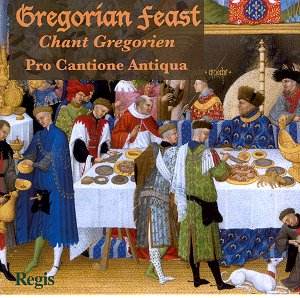Pro
Cantione Antiqua were formed in 1968 to perform music of the
medieval, Renaissance and Baroque eras. A particular feature
of many of their recordings of sacred polyphony was the use
of male voices for all four parts. Over the years they have
been joined by a succession of distinguished names, Michael
George, Ian Partridge, James Bowman, Stephen Roberts, David
Thomas and Paul Elliot. A link between many of the members of
the group was that they had begun their singing careers in the
choir of Westminster Cathedral under Colin Mawby and so were
familiar with the regular use of plainchant.
This
disc assembles recordings, made in the early 1990s, of the propers
for six Feast Days in the Church’s year. In addition the group
performs the Dies Irae and the Hymn Aeterna Christi Munera (on
which Palestrina based one of his best known masses).
Propers
of the mass are the Biblical texts which are sung at specific
points in the service and which are particular to the day, date
and time of the service. As opposed to the Ordinary of the Mass
which comprised the Kyrie, Gloria, Credo, Sanctus, Benedictus
and Agnus Dei, the texts of which were fixed and did not vary
from mass to mass. Propers are performed at the opening of the
mass, Introit, after the first reading, Gradual,
before the Gospel, Alleluia, during the offertory, Offertory,
and during communion, Communion. On this disc the group
omit the Alleluias but perform the other four propers
for each of the feasts.
Pro
Cantione Antiqua perform in a good straightforward style with
not too much over-pointing. Their delivery is accurate and efficient,
always musical and shapely. On these recordings the group consists
of just six singers (plus Stephen Roberts as cantor on the Dies
Irae). They are recorded in suitable acoustics; they are not
too closely miked and the acoustic is not overwhelming but the
recording remains atmospheric, giving something of the ‘feel’
of the church. Where the group misses out is in a sense of intense
sacredness and the sheer naturalness that comes from singing
chant every day. This is something which the various recordings
made in Monasteries can bring to this repertoire. Such recordings
of monks may not always have the high musical values which this
ensemble brings to the music, but monastic groups often demonstrate
the sheer religious power of the chant and the naturalness that
comes from singing together every day.
For
those not intimately familiar with the repertoire, this disc
might present problems. The booklet includes an illuminating
essay on plainchant in general along with a short discussion
of the feasts celebrated on the disc. But no texts are printed,
either in Latin or in translation. With one exception, all of
the propers are referred to by their function (Introit,
Gradual etc.) rather than their text, so I was sent scurrying
off to my Roman Gradual (I happen to sing in a Latin mass choir
on Sunday mornings, so I possess such books) to check what the
texts actually were; though it must be said that the group’s
diction is so good that you can make out 90% of the Latin without
the help of a book. But once I had consulted my Roman Gradual
I discovered another interesting (or annoying) fact. The version
of the propers being performed was not that of the current Roman
Gradual - which post-dates the changes made at the 2nd
Vatican Council. Unfortunately the booklet fails to tell us
which versions of the propers are being performed. This might
seem like nit-picking, but without such details you can’t help
feeling that this very reasonably priced disc has been produced
with something of an eye on the new age/background music chant
market ... and that is to do these recordings a major disservice.
This
disc is highly recommendable for anyone who wants good straightforward
chant singing. Pro Cantione Antiqua are always mellifluous and
always shapely and never fail to be musical. I feel churlish
for wanting more.
Robert Hugill

![]() Pro Cantione Antiqua (James Griffett, Ian Partridge, Gordon Jones, Brian
Etheridge, Michael George, Adrian Peacock)
Pro Cantione Antiqua (James Griffett, Ian Partridge, Gordon Jones, Brian
Etheridge, Michael George, Adrian Peacock)![]() REGIS RECORDS RRC 1217 [65.13]
REGIS RECORDS RRC 1217 [65.13]










